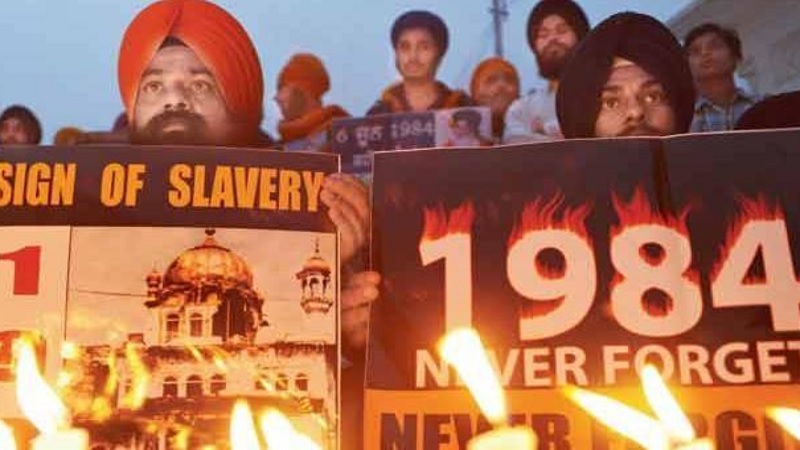
Image Courtesy: livelaw.in
The Supreme Court, on Thursday, November 3, took on record the summarised report filed by a court-constituted 2014 Special Investigation Team pertaining to the 1984 anti-Sikh riots cases. A bench comprising justices AS Bopanna and PS Narasimha deferred the hearing of a plea seeking fresh investigation into the 1984 riots for two weeks to enable an examination of the SIT report. It is now 38 years since the brute anti-Sikh pogrom in the nation’s capital and justice has barely been done.
Senior advocate HS Phoolka, appearing on behalf of the petitioner, S Gurlad Singh Kahlon, cited the SIT report filed on November 29, 2019, to argue that the authorities have been conducting sham trials. It was the Centre that had, in 2014 set up a three-member SIT headed by IPS officer Pramod Asthana to examine the possibility of reopening 293 cases related to the 1984 riots for investigation. The panel found that investigations in 241 of these cases were fit to be closed. Kahlon challenged these findings in the top court. A bench led by the then Chief Justice of India Dipak Misra agreed that the panel had not conducted a detailed probe in a large number of those cases and ordered the constitution of a new SIT.
Now, on November 3, 2022, the summarised report submitted by a special investigation team (SIT) appointed by the court in the cases involving the 1984 anti-Sikh riots was taken on record by the Supreme Court of India. The hearing on a petition for a further investigation into the 1984 riot cases will take place in two weeks.
Senior advocate HS Phoolka, who has been appearing for the Survivors, referred to the SIT report submitted three years ago, on November 29, 2019, and charged that sham trials had occurred in the 1984 cases. It was the petitioner himself, Gurlad Singh Kahlon, who had urged the formation of an SIT at the SC’s behest.
For example, in FIR No. 433/84 registered at the Kalyanpuri police station, the police reportedly sent a challan (an official document) alleging the murder of 56 people, but the trial court only framed charges in respect of the killing of five person, while no charges were framed regarding the remaining murders. According to the report, witnesses testified in court about the murders of their loved ones, but since the other accused were not charged, the testimony of the witnesses was ineffective and no one was punished. “It is not known why charges were framed only for five murders and not 56 murders and why the trial court did not order separation of trial for each incident of crime,” Mr Phoolka stated, reading from the report.
The investigation also said that it is unknown why only five murders, rather than 56, were charged, and why the trial judge did not order a separate trial for each crime.
When a witness testified in court that she had witnessed the incident and could identify the perpetrators, the public prosecutor allegedly did not even ask her to name the rioters out of the numerous accused people present in court, as can be deduced from a review of judgments found in these files, according to the report.
The top court said it will go through the report and has now posted the matter for hearing after two weeks.
Background
Large-scale violence had broken out in the national capital in the aftermath of the assassination of the then prime minister Indira Gandhi, by her two Sikh security guards on the morning of October 31, 1984. Over 2,700 people were killed in the violence in Delhi alone.
The Centre had, in 2014 set up a three-member SIT headed by IPS officer Pramod Asthana to examine the possibility of reopening 293 cases related to the 1984 riots for investigation. The panel found that investigations in 241 of these cases were fit to be closed. Kahlon has challenged these findings in the top court. A bench led by the then Chief Justice of India Dipak Misra agreed that the panel had not conducted a detailed probe in a large number of those cases and ordered the constitution of a new SIT.
Thus, in January 2018, a three-member SIT was re-constituted by the Supreme Court to examine 186 such cases. The team of Justice S N Dhingra, Abhishek Dular and retired IPS officer Rajdeep Singh was directed to submit an interim report after two months. Singh was unable to join the SIT, and the SC asked the remaining members to go ahead with their examination without a third member. The panel started its work in the beginning of 2019. Some of the cases examined by the Asthana panel were among those referred to it. The report was finally submitted in November 2019.
Related:
India: Where mass murderers go unpunished
1984 anti-Sikh riots convict gets death sentence, another gets life term
34 years and counting: No justice for victims of 1984 Sikh genocide
Twenty-five years later – No justice for the 1984 survivors